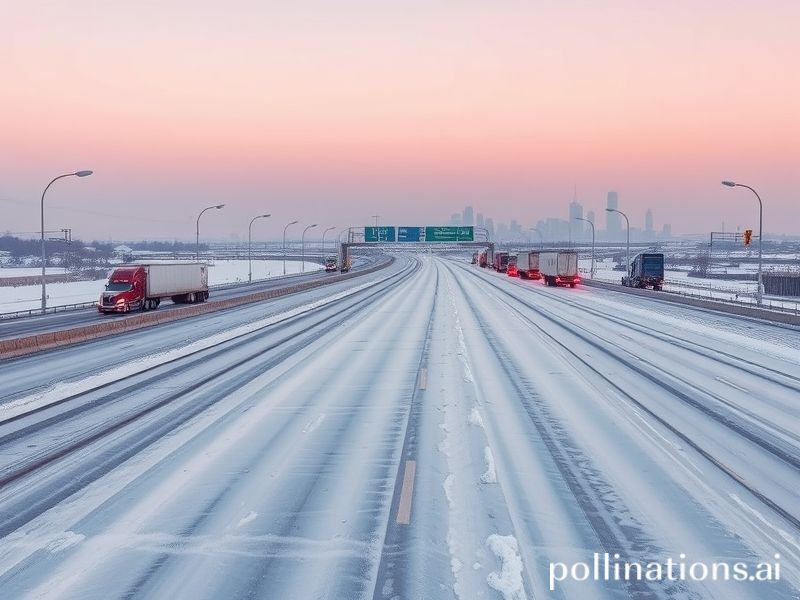Dallas Ice Storm Sends Global Shivers: When Texas Freezes, the World Slips
**Dallas Ice: When Hell (or Texas) Freezes Over and the World Takes Notes**
Dallas—home to oil barons, oversized steaks, and a football team that hasn’t seen a Super Bowl since the Clinton administration—recently discovered ice. Not the kind you put in your bourbon, but the kind that shuts down highways, bursts pipes, and makes international headlines for all the wrong reasons. While Texans were busy reenacting *Frozen* minus the musical numbers, the rest of the planet watched with the kind of morbid curiosity usually reserved for slow-motion car crashes or British royal family drama.
Let’s be clear: Dallas ice isn’t just a meteorological hiccup. It’s a geopolitical Rorschach test. When a city that once branded itself as the embodiment of American resilience gets brought to its knees by a half-inch of frozen water, it sends a message. And that message, translated into every language from Mandarin to Swahili, reads: “If this can happen here, we’re all screwed.”
From the frostbitten vantage point of Stockholm or Moscow, where winter is less a season and more a lifestyle choice, the chaos in Dallas looks like a sitcom written by nihilists. Russian state media, never one to miss a chance to gloat, aired footage of Texans boiling snow for drinking water with the same smugness they reserve for U.S. election coverage. Meanwhile, in Finland—where children learn to ice skate before they can walk—Dallas’s plight was met with a collective shrug and a spike in Twitter memes featuring reindeer wearing cowboy hats.
But beneath the schadenfreude lies a colder truth: climate change is making weather patterns everywhere more erratic, and no one is immune. The same polar vortex that turned Dallas into a punchline also disrupted supply chains across North America, delaying everything from microchips to avocados. That’s right—your guacamole in Paris might cost more because a Texan didn’t insulate their water pipes. Globalization, it seems, has a twisted sense of humor.
And then there’s the power grid. Texas’s insistence on operating its own electrical system—free from federal oversight and, apparently, common sense—proved about as effective as a chocolate teapot. When the grid failed, it wasn’t just Dallas that felt the chill. Bitcoin mining operations, which had flocked to Texas for its cheap electricity and laissez-faire regulators, went offline faster than you can say “cryptocurrency crash.” The result? A brief but noticeable dip in global Bitcoin processing power, proving once again that the digital economy is only as strong as the grid it leans on—no matter how many times crypto bros insist otherwise.
Of course, the human toll is no laughing matter—unless you find dark comedy in the fact that a state boasting more billionaires than most countries have diplomats couldn’t keep its citizens warm. The irony is particularly piquant for a place that once promised energy independence and now can’t promise functioning faucets. Somewhere in Houston, an oil executive is quietly updating his LinkedIn profile to include “crisis management” and “infrastructure apologia.”
Internationally, the Dallas ice event is being studied not as an anomaly, but as a cautionary tale. Cities from São Paulo to Sydney are quietly auditing their own infrastructure, wondering if they too might be one freak storm away from becoming a global meme. Spoiler alert: they are.
In the end, Dallas ice is less about weather and more about hubris. It’s a frosty reminder that in an interconnected world, local failures have global echoes. And while Texans will undoubtedly bounce back—likely by building bigger trucks and blaming the windmills—the rest of us are left to ponder a simple truth: if civilization can be undone by a little ice in Dallas, maybe we were never that civilized to begin with.







